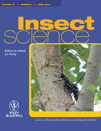
Insect Science
Scope & Guideline
Unveiling the secrets of insect biology and behavior.
Introduction
Aims and Scopes
- Ecology and Evolution of Insects:
Research focusing on the ecological dynamics, evolutionary adaptations, and behavioral strategies of insects in various environments. - Insect Physiology and Neurobiology:
Studies examining the physiological processes and neural mechanisms that govern insect behavior, development, and sensory perception. - Insect-Plant Interactions:
Investigations into the complex relationships between insects and plants, including herbivory, mutualism, and plant defense mechanisms. - Insect Pest Management:
Research aimed at developing sustainable methods for managing insect pests in agricultural and urban settings, including integrated pest management strategies. - Insect Conservation and Biodiversity:
Studies addressing the conservation of insect species and their habitats, and the impact of global change on insect biodiversity. - Biological Control and Pathogen Interactions:
Research exploring the use of natural enemies and microbial interactions for pest control, including the role of parasitoids and pathogens.
Trending and Emerging
- Microbial Interactions and Insect Health:
Research focusing on the role of microbiomes in insect health, behavior, and resistance to diseases is rapidly gaining traction, highlighting the importance of symbiotic relationships. - Climate Change and Insect Responses:
Studies examining the impacts of climate change on insect populations, behaviors, and interactions are becoming increasingly prevalent, reflecting global environmental concerns. - Genomic and Genetic Approaches:
Emerging technologies in genomics and genetic modification are being applied to understand insect biology, evolution, and pest management strategies. - Artificial Intelligence in Insect Research:
The application of AI and machine learning techniques in analyzing insect behavior and ecology is a growing trend, reflecting advancements in technology and data analysis. - Social Insect Dynamics and Caste Systems:
In-depth studies on social insects, particularly regarding their complex social structures, communication, and caste dynamics, are increasingly featured in recent publications.
Declining or Waning
- Traditional Chemical Control Strategies:
Research on conventional pesticide applications and chemical control methods may be declining due to increasing interest in sustainable and integrated pest management approaches. - General Insect Taxonomy:
While taxonomy remains important, the focus on broad taxonomic studies appears to be diminishing as researchers prioritize ecological and functional studies over purely taxonomic work. - Insect Behavior Studies in Isolation:
Studies of insect behavior that do not consider ecological context or interactions with other species are becoming less common, as integrative approaches gain prominence.
Similar Journals
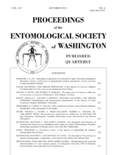
PROCEEDINGS OF THE ENTOMOLOGICAL SOCIETY OF WASHINGTON
Exploring the Complex World of InsectsProceedings of the Entomological Society of Washington is a distinguished journal dedicated to the field of entomology, published by the Entomological Society of Washington. With a rich history dating back to 1981 and a commitment to fostering scientific discourse, this journal serves as a vital platform for researchers and professionals specializing in insect science and ecology. It holds a respectable<> impact factor and is categorized in the Q3 quartile in both Ecology, Evolution, Behavior and Systematics and Insect Science, indicating its relevance within the scientific community. Although it does not offer open access, it provides a curated selection of high-quality research articles that significantly contribute to the understanding of insect biology, behavior, and taxonomy. The journal aims to bridge gaps in current research and inspire innovations in entomological studies, making it an essential resource for students, researchers, and practitioners in the field.
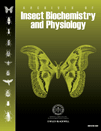
ARCHIVES OF INSECT BIOCHEMISTRY AND PHYSIOLOGY
Connecting Research and Practical Applications in EntomologyArchives of Insect Biochemistry and Physiology, an esteemed journal published by WILEY, stands at the forefront of advancing the understanding of insect physiology and biochemistry. With an ISSN of 0739-4462 and E-ISSN of 1520-6327, this journal serves as a critical resource for researchers and professionals in the fields of biochemistry, insect science, and physiology. As of 2023, it holds a respectable impact factor with a Q3 ranking in Biochemistry and Physiology, and a Q2 in Insect Science, highlighting its relevant contributions to these disciplines. The journal has maintained a continuous publication history from 1983 to 2024, hosting pioneering research and review articles that inform both academic and practical applications in entomology. While it does not currently offer open access, it is accessible through various institutional subscriptions, ensuring widespread availability of essential findings. This journal plays a vital role in elucidating the complex biochemical pathways and physiological adaptations of insects, fostering knowledge that is crucial for ecological research, agricultural development, and conservation efforts.

Frontiers in Insect Science
Connecting Scholars in the World of InsectsFrontiers in Insect Science is a pioneering open-access journal dedicated to the advancement of knowledge in the field of insect science. Published by FRONTIERS MEDIA SA in Switzerland, this journal serves as a vital platform for researchers, professionals, and students to disseminate high-quality, peer-reviewed research spanning diverse topics within insect biology, ecology, and pest management. Since its establishment in 2021, the journal has gained recognition, ranking in the Q2 category of Insect Science with a Scopus ranking of #92 out of 181 in the field. With a commitment to promoting open access and collaboration, Frontiers in Insect Science is instrumental in fostering innovative research and practical applications essential for combating biodiversity loss and enhancing agricultural sustainability. As a freely accessible resource, it invites contributions that impact both fundamental and applied insect research, connecting a global network of scholars eager to explore the fascinating world of insects.
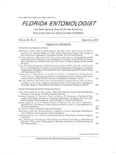
FLORIDA ENTOMOLOGIST
Advancing the Frontiers of Insect ScienceFLORIDA ENTOMOLOGIST is a prestigious peer-reviewed journal dedicated to the advancement of entomological sciences, published by Walter de Gruyter GmbH. Since its transition to open access in 1994, the journal has become a vital resource for researchers, students, and professionals in the fields of Insect Science and Ecology, Evolution, Behavior, and Systematics. With an impact factor ranking high in its category—Q2 in Insect Science and Q3 in Ecology, Evolution, Behavior and Systematics—the journal showcases significant findings and contributions that shape our understanding of insect biology and its implications for ecological systems. The journal is indexed in Scopus, further establishing its relevance, with current rankings reflecting its competitive standing within Agricultural and Biological Sciences. Published continuously since 1982, FLORIDA ENTOMOLOGIST not only facilitates the dissemination of knowledge among entomologists but also encourages interdisciplinary collaboration, making it an essential publication for anyone invested in the scientific study of insects.

CANADIAN ENTOMOLOGIST
Cultivating a Deeper Understanding of Insect InteractionsCanadian Entomologist, published by Cambridge University Press, is a prominent journal dedicated to the field of entomology, covering key areas such as insect science, ecology, and evolutionary biology. With its origins dating back to 1868, this esteemed journal has continuously contributed to the understanding of insect behavior, systematics, and physiology, engaging researchers and professionals alike. Although currently not an Open Access journal, it offers valuable insights through its rigorously peer-reviewed articles, reflecting its commitment to scientific excellence. The journal has garnered a respectable Q3 ranking in various categories, including Ecology, Evolution, Behavior, and Systematics, making it a critical resource for scholars and students who seek to explore the complex interactions within insect populations and their environments. Researchers can trust Canadian Entomologist to provide relevant and impactful research that shapes contemporary understanding in the realm of entomological studies, fostering the growth of this vital scientific discipline.

Current Research in Insect Science
Pioneering Research in Insect Ecology and EvolutionCurrent Research in Insect Science is a premier journal published by Elsevier, dedicated to advancing knowledge in the field of insect science and its multifaceted applications across ecology, evolution, and behavior. Established in 2021, this journal aims to provide a platform for researchers to disseminate innovative findings that address the ecological significance of insects, their evolutionary processes, and their behavior in diverse environments. With an impressive Q2 ranking in Animal Science and Zoology, Ecology, Evolution, Behavior and Systematics, and Insect Science categories, the journal enjoys a reputable status within the academic community. Its Scopus ranks reflect its impactful contributions to the field, placing it within the top 30% of publications in relevant disciplines. While the journal operates on an open access model, ensuring wide accessibility to research, it remains committed to maintaining rigorous peer-review standards. Researchers, professionals, and students alike will find Current Research in Insect Science an invaluable resource for staying informed on the latest advancements and discussions in insect biology.
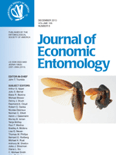
JOURNAL OF ECONOMIC ENTOMOLOGY
Connecting Entomology with Real-World ApplicationsJOURNAL OF ECONOMIC ENTOMOLOGY, published by OXFORD UNIV PRESS INC, stands as a premier interdisciplinary platform for researchers and professionals in the realms of entomology and ecological sciences. With a robust publication history dating back to 1945, this esteemed journal has consistently maintained its reputation for disseminating high-quality research, as evidenced by its prestigious Q1 rankings in both Ecology and Insect Science for 2023. The journal’s impact is highlighted by its excellent Scopus ranks, placing it in the top percentile of Agricultural and Biological Sciences and Environmental Science categories. Aimed at advancing the understanding of insects and their relationships with humans and ecosystems, the JOURNAL OF ECONOMIC ENTOMOLOGY offers a critical forum for original research articles, reviews, and opinion pieces that influence practices in pest management, conservation, and agricultural productivity. Although not an Open Access journal, its findings are pivotal for students, researchers, and professionals striving to address contemporary challenges in entomology and beyond.

REVISTA DE LA SOCIEDAD ENTOMOLOGICA ARGENTINA
Fostering Global Collaboration in Entomological StudiesREVISTA DE LA SOCIEDAD ENTOMOLOGICA ARGENTINA is an esteemed open-access journal dedicated to the field of entomology, published by the SOCIEDAD ENTOMOLOGICA ARGENTINA. Since its transition to open access in 2013, the journal has sought to promote research in insect science, ecology, and related disciplines, facilitating global dissemination of knowledge and encouraging collaborative studies across borders. Located in the vibrant scientific landscape of La Plata, Argentina, the journal is indexed in Scopus and categorized in the fourth quartile of ecology and insect science, reflecting its commitment to enhancing the discourse within these critical fields. Aiming to bridge the gap between researchers, students, and professionals, REVISTA DE LA SOCIEDAD ENTOMOLOGICA ARGENTINA serves as a platform for innovative research, reviews, and reports on ecological interactions, behavior, and systematic entomology, ultimately driving forward our understanding of insect biodiversity and its broader environmental impacts.
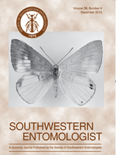
SOUTHWESTERN ENTOMOLOGIST
Advancing Knowledge in Entomology and EcologySOUTHWESTERN ENTOMOLOGIST is a pivotal academic journal dedicated to advancing the fields of Agronomy, Ecology, and Insect Science. Published by the SOUTHWESTERN ENTOMOLOGICAL SOC in the United States, this journal plays a crucial role in disseminating vital research findings that address pressing ecological and agricultural challenges. With its ISSN 0147-1724 and E-ISSN 2162-2647, the journal has been publishing comprehensive studies since 1993 and continues to contribute significantly to the knowledge base up to 2024. As a Q4 ranked journal in both Agronomy and Crop Science and Ecology, as well as Insect Science, it provides an inclusive platform for researchers and students to share their insights and foster collaborations. Although it currently does not offer open access options, the content is accessible to academic institutions and professionals, ensuring that significant findings reach a broad audience. Given its niche focus, SOUTHWESTERN ENTOMOLOGIST not only appeals to researchers and students but also to professionals looking to stay updated on the latest trends and developments in entomology and its related fields.
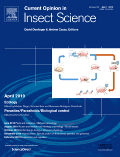
Current Opinion in Insect Science
Illuminating the World of Insect ResearchCurrent Opinion in Insect Science is a leading academic journal published by ELSEVIER, dedicated to advancing understanding in the field of insect science. With an impressive impact factor reflected in its top quartile rankings (Q1) within both Ecology, Evolution, Behavior and Systematics and Insect Science, the journal holds a prominent position, ranking 3rd out of 181 journals in Insect Science and 35th out of 721 in Ecology-related fields according to Scopus for 2023. Since its inception in 2014, the journal has provided a dynamic platform for researchers, professionals, and students to explore and share cutting-edge developments and insights, targeting crucial topics in insect biology, ecology, and systematics. Although there are no open access options available, Current Opinion in Insect Science remains an essential resource for those looking to stay at the forefront of their research or academic interests.